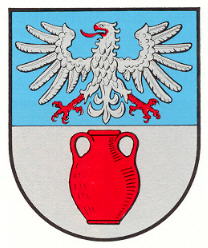Hettenhausen: Difference between revisions
Jump to navigation
Jump to search
Knorrepoes (talk | contribs) m (Text replacement - "|'''English''' ↵| {{blazon wanted}}↵" to "|'''English''' | blazon wanted ") |
Knorrepoes (talk | contribs) m (Text replacement - "↵{{de1}}↵{{media1}}↵↵'''Literature''': Debus, 1988↵↵[[Category:German" to " '''Literature''': Debus, 1988 {{de1}} {{media1}} [[Category:German") |
||
| Line 25: | Line 25: | ||
The arms were designed in 1980 as no historical seals or arms existed. The upper half shows the eagle of the Counts of Leiningen, as until the late 18<sup>th</sup> century the village belonged to the County Leiningen-Hardenburg-Dagsburg. The base shows a vase, symbol for the urns found in a prehistoric cemetery during an excavation in 1938. It thus symbolises the long inhabitation of the area. | The arms were designed in 1980 as no historical seals or arms existed. The upper half shows the eagle of the Counts of Leiningen, as until the late 18<sup>th</sup> century the village belonged to the County Leiningen-Hardenburg-Dagsburg. The base shows a vase, symbol for the urns found in a prehistoric cemetery during an excavation in 1938. It thus symbolises the long inhabitation of the area. | ||
[[Civic Heraldry Literature - Germany|'''Literature''']]: Debus, 1988 | |||
{{de1}} | {{de1}} | ||
{{media1}} | {{media1}} | ||
[[Category:German Municipalities H]] | [[Category:German Municipalities H]] | ||
Revision as of 09:24, 21 July 2023
HETTENHAUSEN
State : Rheinland-Pfalz
District (Kreis) : Südwestpfalz
Verbandsgemeinde : Verbandsgemeinde Wallhalben
| German |
Von Blau und Silber geteilt, oben ein rotbewehrter silberner Adler, unten eine rote Urne. |
| English | blazon wanted |
Origin/meaning
The arms were granted on November 20, 1981.
The arms were designed in 1980 as no historical seals or arms existed. The upper half shows the eagle of the Counts of Leiningen, as until the late 18th century the village belonged to the County Leiningen-Hardenburg-Dagsburg. The base shows a vase, symbol for the urns found in a prehistoric cemetery during an excavation in 1938. It thus symbolises the long inhabitation of the area.
Literature: Debus, 1988
